John Janaro's Blog, page 303
February 17, 2013
Real Life, Real People, Real Love
 "If you confess with your mouth that Jesus is Lord and believe in your heart that God raised him from the dead, you will be saved" (Romans 10:9).
"If you confess with your mouth that Jesus is Lord and believe in your heart that God raised him from the dead, you will be saved" (Romans 10:9).
The name of Jesus is a prayer. When I confess that Jesus is Lord, I am doing so much more than just saying words. I am expressing my commitment in a perceptible way. I am bearing witness. I am lifting up my soul in prayer to the One for whom everything has been created, the One who was born and died and rose from the dead, the One who established Himself as the center and the fulfillment of history, the One who draws all things to Himself, the One who has entered my life, my history, and has proven that the meaning of my life is to belong to Him.
I confess that Jesus is Lord.
He is my Lord. I exist for Him, in a world that exists for Him, this God who became a man and poured Himself out in love on the cross. He pours Himself out in love for me in this moment; He begs me to open my heart and let Him love me in this moment, so that He might fill me with His Spirit and free me to love Him and be transformed in His likeness and cry out "Abba!" This is life. God. Love.
My mouth. This is the reason my mouth was created: to say, "Jesus is Lord!"
For me, this is not an abstract idea. Jesus has grabbed hold of my real life. Every day I see faces that remind me that this is a fact. My confession of faith is not made in solitude. I belong to the Church, and this "Church" is not a faction, not an organization defined by some agenda. It is "living stones," it is real people.
 Even as I type these words, I am not alone. The Church is in my living room. Here are six people who remind me that Jesus is Lord of this moment. We are a family. Sometimes we drive one another crazy and get frustrated. We are always falling short, and failing one another. Still, He is Lord, and He is changing us through this life. He is shaping our lives right now, in this moment. Here is this woman and these children (watching a hockey game, doing homework, driving a toy truck on the arm of my chair); without Jesus this moment would have been impossible. Without Jesus, we would not be together. This moment is entirely the fruit of a history of belonging to Him.
Even as I type these words, I am not alone. The Church is in my living room. Here are six people who remind me that Jesus is Lord of this moment. We are a family. Sometimes we drive one another crazy and get frustrated. We are always falling short, and failing one another. Still, He is Lord, and He is changing us through this life. He is shaping our lives right now, in this moment. Here is this woman and these children (watching a hockey game, doing homework, driving a toy truck on the arm of my chair); without Jesus this moment would have been impossible. Without Jesus, we would not be together. This moment is entirely the fruit of a history of belonging to Him.The commitment of marriage and family does not have its source in my own generosity. I know very concretely that without Jesus, I would never find the courage to share my life with another human person, much less to surrender myself with this other person to the creative freedom of God so that new human persons might come into the world and experience love through us.
Without Jesus, this doesn't happen.
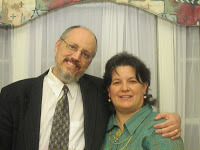 I am certain that those who aspire to live marriage and family in a true way are sustained by the grace of Jesus Christ. If they do not know His name explicitly, still it is His grace that engenders within their hearts the seeking, the hope, the longing to see the face that makes love possible. In that longing, that poverty, He draws them and sustains them and shapes their hearts and their voices so that one day they will sing the glory of His name.
I am certain that those who aspire to live marriage and family in a true way are sustained by the grace of Jesus Christ. If they do not know His name explicitly, still it is His grace that engenders within their hearts the seeking, the hope, the longing to see the face that makes love possible. In that longing, that poverty, He draws them and sustains them and shapes their hearts and their voices so that one day they will sing the glory of His name.I am certain of this. I know that without Jesus, my own life is impossible.
Without Jesus; without the Church and her enduring witness; without the supernatural strength of the sacraments; without the people (beginning with my own mother and father, my brother, and others--you know who you are) who confessed with their mouths and lived with their lives this faith, and who communicated to me a love of God that is greater than all my fears...without this reality I have no life.
I have seen life. I have seen with my own eyes that Jesus makes it possible to live a marriage and not be afraid of life, of children, of the mystery of children who need love that is greater than anyone can give.
I have lived with these people, who can give themselves in little gestures, who witness the love of God in their goodness and their confusion, who struggle and endure and suffer and find joy. I know these people who are so inadequate and broken in themselves, but who are not defeated by their own failures; these people who find forgiveness and extend forgiveness and carry on with a hope that is greater than their weakness.
And I have known certain real people who love Jesus with a vividness that sacrifices everything in an exclusive commitment to Him, a commitment to speak His name to all, to go anywhere, to pour themselves out for persons they have never met....
 Without the experience of such a love for Jesus and for me, my life would be nothing. I would have my solitude, my sickness, and the prison of my own thoughts. And a deep desperate cry to an unknown Someone: "please, come!"
Without the experience of such a love for Jesus and for me, my life would be nothing. I would have my solitude, my sickness, and the prison of my own thoughts. And a deep desperate cry to an unknown Someone: "please, come!"Jesus is Lord.
I have seen this. And it is real life. I tell fun stories about my family, and we do have a lot of fun, but family life is hard. Its mysterious and overwhelming. Its messy. Its exhausting. Its a human family, and Jesus doesn't do magic. He doesn't make our humanity disappear; He embraces it and transforms it in His patience, in time.
The name of Jesus is not magic. There are many people who talk about Jesus and do stupid things. Even crazy things. There is nothing surprising about human failure.
The miracle is this life which amazes us, which makes us go forward, stumbling, falling, forgetting, being sorry, being forgiven, stumbling and going forward, convinced that He is with us and that His love is greater than everything.
I have seen a life that is only possible because He has conquered fear, He has conquered death. He has really, truly been raised from the dead, in transformed and glorified flesh and blood. I believe this in my heart. It is His flesh and blood and His glory that makes my own life. It conquers my weakness, renews my spirit, sustains my hope.
Published on February 17, 2013 18:23
February 16, 2013
Wash Me, and Make Me Clean
"Wash yourselves; make yourselves clean. Remove the evil of your doings from before my eyes. Cease to do evil, learn to do good; seek justice, correct oppression; defend the fatherless, plead for the widow" (Isaiah 1:16-17).
Jesus, I beg You, wash me.Make me clean.Draw me away from evil.Teach me to do good.Awaken my soul to seek justice and truth,and to stand on the side of those who suffer.
Jesus, wash me; make me clean.Enable me to say "yes" every dayto the truth about life.Enable me to adhere to Your will,trusting that Your will is Your perfect wisdom,and Your inexhaustible goodness,and Your ineffably tender care for me.
Jesus, wash me; make me clean.Enable me to follow the call,that echoes through all of realityand resonates in the deepest core of me;the call to seek and to find Infinite Love.
Jesus, by Your wisdom and goodness,Your beauty and Your mercy,Your death and resurrection,Grant that I might "learn to do good"and so grow in Your likeness,which is Love.
Jesus, I beg You, wash me.Make me clean.Draw me away from evil.Teach me to do good.Awaken my soul to seek justice and truth,and to stand on the side of those who suffer.
Jesus, wash me; make me clean.Enable me to say "yes" every dayto the truth about life.Enable me to adhere to Your will,trusting that Your will is Your perfect wisdom,and Your inexhaustible goodness,and Your ineffably tender care for me.
Jesus, wash me; make me clean.Enable me to follow the call,that echoes through all of realityand resonates in the deepest core of me;the call to seek and to find Infinite Love.
Jesus, by Your wisdom and goodness,Your beauty and Your mercy,Your death and resurrection,Grant that I might "learn to do good"and so grow in Your likeness,which is Love.
Published on February 16, 2013 11:17
February 13, 2013
Parched Land
 "Like a parched land my soul thirsts for you" (Psalm 143:6).
"Like a parched land my soul thirsts for you" (Psalm 143:6).
As Lent begins, we have many reminders of the fundamental truth about our selves: "My soul thirsts for you!" Msgr. Giussani always stressed that this "thirst" constitutes who I am. This is a fact. I am "thirst for God." The depths of myself are constituted by this thirst. I move through life in search of the mysterious drink that will satisfy this thirst.
It is good to remember that I am a "parched land."
It is good, above all, because God gives the waters of life. On our earthly journey, we discover our need to drink ever more deeply, and we ourselves become vessels of water in the parched lands that thirst everywhere around us.
Jesus says,"If any one thirst, let him come to me and drink. He who believes in me, as the scripture has said, 'Out of his heart shall flow rivers of living water'" (John 7:37-38).
Published on February 13, 2013 20:00
February 12, 2013
Letting Himself Become Small
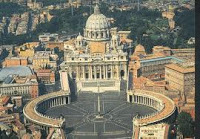 What? A Pope resigns?
What? A Pope resigns?This hasn't happened in 600 years!!!
Why is Pope Benedict XVI taking this rare and peculiar step?
Sure, its happened a few times in history. But Benedict hasn't been imprisoned during a persecution like the early popes who resigned. And this is hardly like the wacky and chaotic period of the Council of Constance, 600 years ago, when there were three guys claiming to be the real pope. Add to the mix one of those always helpful (?) devout Catholic monarchs (the Emperor Sigismund), who decided to get involved, and....
Its a long story, but to get to the point, Pope Gregory XII (who was the legitimate pope) agreed to resign and gave the Council authority to choose his successor. Then the two antipopes were deposed. The Council appointed Gregory bishop of Frascati and Dean of the college of cardinals. But it took Constance two years to elect his successor, Martin V...which means that for two years the papacy was vacant, but the ex-pope was alive and well and cardinal bishop of a prestigious diocese right outside of Rome!
There have been some confusing times in the history of the Church. Most of the times of the Church have been confusing times. But she's still here.
Actually, Benedict's situation resembles more that of Pope St. Celestine V, who resigned at the end of the 13th century. In fact, he was a Benedictine monk who was plucked from his austere solitude and made bishop of Rome. He was incapable of the task, however, and resigned because he wanted to return to his life of prayer. (Note, the "St." in front of Celestine's name stands for S aint -- thus it would appear that resigning the papacy doesn't mean you're a bad person.)
Pope Benedict's reasons for resigning, whatever they may be, are born from his desire to follow Christ and serve the Church. He knows that the Church endures through the work of the Holy Spirit, and that this is a work of "reform in continuity." It is a work that remains vital at this unprecedented moment in the history of the human race.
The world is indeed in transition to a new epoch, fraught with unimaginable possibilities and unimaginable dangers. Benedict XVI has always known this. He has left an enduring legacy of wisdom for this emerging epoch. The great pain of his labors is not less for the fact that he has only now revealed it to us.
Still, his work is not finished. He is going forth to pray, to continue to seek the face of God. In this too, he teaches us.
In this new gigantic world of power, he is letting himself become small. He is embracing the poverty through which God works.
Published on February 12, 2013 20:00
February 11, 2013
You Have Been a Blessing to Us
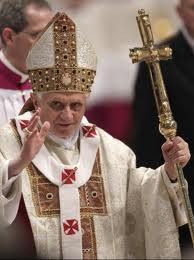
"After having repeatedly examined my conscience before God....
I have had to recognize my incapacity....
I ask pardon for all my defects....
I wish to also devotedly serve the Holy Church of God in the future
through a life dedicated to prayer."
--from the Declaration of February 11, 2013
Pope Benedict XVI
Published on February 11, 2013 12:43
February 9, 2013
"In the World...." Remembering Michael Schwartz
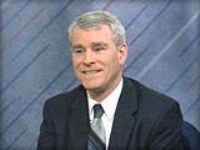 Mike Schwartz was a remarkable man, and it was with surprise that I learned of his recent death on February 3, at only 63 years old, after struggling for a year and a half with ALS. I didn't even know he was sick.
Mike Schwartz was a remarkable man, and it was with surprise that I learned of his recent death on February 3, at only 63 years old, after struggling for a year and a half with ALS. I didn't even know he was sick.Its probably been more than twenty years since I last spoke with Mike. I knew him from my student days, and then from my brief stint as a policy analyst on Capitol Hill (yeah, I did some time on "the Hill," back in the '80s...days of my youth, almost forgotten).
I have many happy memories of those days. I remember lectures he gave on political philosophy at our college. The man was brilliant. He was a philosophical and theological man in the best sense, in that he was always seeking to understand the most important things even as he kept both feet on the ground. I want to say, "He could have been a scholar" but in fact he was a scholar. He was a rare bird in America (or anywhere else): a well-read, deep-thinking, truth-seeking political activist.
He also knew how to connect with people, from homeless people to mothers and their unborn children to sexual abuse victims to media personalities to the big men who drove the engines of power. And he knew how to connect with and motivate young people. He cared about all of us newly winged butterflies: interns, aspiring journalists, idealistic office workers, coffee-brewing Hill staffers, think-tank hacks. He was prematurely gray and he dressed like "the older people," but he was upbeat, encouraging, enthusiastic, and always full of schemes.
Once he got asked to be part of a panel for a local daytime television show discussing the Catholic Church's teachings on sexuality. Then he found out that there were three other panelists who ranged from "not helpful" to red-hot hostile. Mike rounded up a few of us, explained the situation and told us he couldn't do it "alone." So he asked us to get on the phones to our friends and pack the audience with bright, hip young Catholics (yes, there were some of us around, even way back in the 80s).
And we did it! We got a big bunch of people together for that show. He inspired us, somehow, and we made it happen.
Mike had a hard time with the panel, but he did very well. Then they asked for audience "participation." It was amazing. For once the Church didn't get plastered. On the contrary, we made all the comments. Whoever watched that show must have been shocked to see normal young people (even some very pretty girls) intelligently defending the Catholic Church's teaching on sex and marriage. But it was live television; there was no way to stop us!
[Someone reading this was in the audience that day, I'll bet. Do you remember?]
Mike Schwartz gladly gave the limelight to a bunch of kids, so that truth might have a witness on a daytime TV talk show. That's the kind of man he was.
The obits have been pouring out on the internet, rightly extolling his unique combination of political savvy, ardor, kindness, humility, dedication to principles and willingness to fight for them, and also his real love for all people, even those who opposed him. He was a central figure in America's pro-life movement from the very beginning. He worked on social issues with conservative groups, while also being a member of the Democratic party for a good part of his life.
Mike was beyond stereotypes. He was one of those great Catholic activists who appeared in the second half of twentieth century America: courageous, good, and impossible to dismiss with any of the categories of our common political discourse. He was a man who was immersed in political work, but always at the service of others, and never interested in drawing attention to himself. He was dedicated and energetic, but he wasn't sucked into an ideological program; he was not fooled by the glitter of Washington power. He valued politics for what it was, and he knew that politics couldn't solve all our problems; he knew that there were greater things....
It was because of his Catholic faith. His faith really did penetrate his whole life. I was blessed to know several people like him in the days when I was growing up, people whose understanding was totally outside the box...because their focus was on Christ. For me it put flesh and bones on the saying that "Christians must be in the world, but not of the world."
How are we supposed to know what that saying means? By paying attention to people like Mike Schwartz.
Here are a few words from his last public appearance in November 2012. Mike knew that the way to respond to the violence of the abortion plague was to recognize a call to a greater love, a greater prayer and a greater service, a greater affirmation of the true dignity of women, a concern and an attentiveness to the needs of that most fundamental and most vulnerable of human relationships--the relationship between mother and child.
"The service and support network for mothers...is the best and most important part of our movement, but we should realize that pregnancy services are not a stopgap measure until some political victory is achieved. We will always need such services, and perhaps the reason why God allowed the evil of abortion to fall upon us was to awaken us to the need to stop trying to affix scarlet letters to women with untimely pregnancies and begin helping our sisters when they need us most."May God reward you greatly, Mike. Thanks for everything.
...I have a video of that TV show somewhere. I've got to dig it up and watch it again. :)
Published on February 09, 2013 14:05
February 7, 2013
The Delicate Breath of Grace
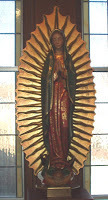 It is so easy to forget that God's initiative, God's gift, is the foundation of every beginning. The Lord encounters us anew every day of our lives, and it is this encounter that awakens us from the stupor of evasive rationalizations and desperate attempts to justify ourselves.
It is so easy to forget that God's initiative, God's gift, is the foundation of every beginning. The Lord encounters us anew every day of our lives, and it is this encounter that awakens us from the stupor of evasive rationalizations and desperate attempts to justify ourselves.Every moment we need the presence of His love, the memory that salvation has come, that life is something more than our solitary and anxious efforts to put together the pieces of our own shattered existence.
And this initiating, healing, tender companionship that is God's love finds an intimacy in our lives through the Woman who brings Him to us, and whose own maternal love accompanies His saving presence.
The world’s salvation is not the work of man
– of science, of technology, of ideology – but comes from grace.
What does this word mean? Grace is love in its purity and beauty, it is God himself such as he is revealed in the salvific history narrated in the Bible and fulfilled in Jesus Christ.
Mary is called “full of grace” (Luke 1:28) and with this identity of hers she reminds us of God’s primacy in our life and in the history of the world; she reminds us that the power of God’s love is stronger than evil, that it can fill the voids that egoism leaves in the history of persons, of families, of the nations of the world.
These voids can become a sort of hell in which human life is drawn downwards toward nothingness, without meaning and without light.... Only love can save us from this fall, but it is not just any kind of love: it is a love that has the purity of grace in it – the grace of God that transforms and renews – and that can breathe, into lungs filled with toxins, new oxygen, clean air, a new energy of life.
Mary tells us that man can never fall so far down that it is too far for God, who descended to the very depths; however far our heart is led into error, God is always “greater than our heart” (1 John 3:20).
The delicate breath of grace can disperse the blackest clouds; it can make life beautiful and rich with meaning, even in the most inhuman situations.
Benedict XVI
Published on February 07, 2013 22:06
February 6, 2013
Does God Give Us Personal Fulfillment?
"A man is not justified by observance of the law but only through faith in Jesus Christ" (Galatians 2:16).
St. Paul's point is very direct, and it corresponds to Jesus's own testimony. We cannot find our true fulfillment by any kind of action that is within the scope of our power. This is because we are made not for self-generated achievement. We are made for relationship with God. We find our true destiny in the "loss" of our "selves," that is, the self-abandonment, the giving of ourselves over in love to the Infinite One who is the Source of all that we are, and who invites us to share in His own Infinite life.
 We think that we can achieve our destiny by actions that we can understand and carry out by ourselves; actions that we can possess entirely, without any relational context, without any loss of ourselves. St. Paul knows that God's people Israel have the Law, with its rituals and precepts. But they are not capable of entering into the interior reality of the Law by themselves. The Law is an expression of the Covenant, which is, in turn, a promise of something greater than itself.
We think that we can achieve our destiny by actions that we can understand and carry out by ourselves; actions that we can possess entirely, without any relational context, without any loss of ourselves. St. Paul knows that God's people Israel have the Law, with its rituals and precepts. But they are not capable of entering into the interior reality of the Law by themselves. The Law is an expression of the Covenant, which is, in turn, a promise of something greater than itself.
Some in Israel seemed to think that the Law was a formula, a way of conjuring God somehow, a way of making themselves worthy of God while still remaining radically independent of God. They wanted to become god-like without giving themselves to God.
But the Covenant was never meant to be a prescription for self-justification. It was never meant to be a "list-of-things-to-do-to-make-myself-righteous" and thereby secure God's approval while remaining within the enclosure of my own self-satisfaction. The Law points beyond itself; it was given to engender hope, to turn the people of Israel outward, to awaken their desire for a more profound and intimate relationship with the God of the Covenant. To "observe" the Law alone is impossible, except in a superficial, outward sense. The entire Old Testament is alive with the cry and the poignant plea to God for "something more," but also a confident hope that God would bring Himself close and enter into a relationship with His people:
Lord, listen to my prayer:
turn your ear to my appeal.
You are faithful, you are just; give answer.
Do not call your servant to judgment
for no one is just in your sight.
Lord, make haste and answer;
for my spirit fails within me.
Do not hide your face
lest I become like those in the grave.
In the morning let me know your love
for I put my trust in you.
Make me know the way I should walk:
to you I lift up my soul.
(Psalm 143:1-2, 7-8)
Jesus Christ is the answer to this prayer. "Faith in Jesus Christ" draws us into a gift of ourselves to Him, through that hopeful and loving trust engendered in us by His grace that awakens us to mystery of our vocation. God calls us to share in His life, to become "like Him" in a way beyond anything we could have imagined. We are called to share in Jesus's love for the Father in the Spirit.
It turns out that "giving myself away totally to God" is not something that demeans my freedom or results in the loss of my dignity as a person. On the contrary, it is the realization of freedom and of the person. For God Himself is Infinite Self-Giving Love. The Trinity reveals that total self giving is at the very root of what it means to be a person.
Jesus says, "I am in the Father and the Father is in me" (John 14:11). And we will fulfill the true meaning of ourselves as persons, we will achieve the destiny and fulfillment for which we have been created, by abandoning ourselves to Him and trusting in Him: "Whoever loses his life for my sake will find it" (Matthew 10:39).
We have been created to become gifts, to realize our freedom as love, to live in relationship as persons, and to "find ourselves" forever in relationship to God the Father, the Son, and the Holy Spirit.
St. Paul's point is very direct, and it corresponds to Jesus's own testimony. We cannot find our true fulfillment by any kind of action that is within the scope of our power. This is because we are made not for self-generated achievement. We are made for relationship with God. We find our true destiny in the "loss" of our "selves," that is, the self-abandonment, the giving of ourselves over in love to the Infinite One who is the Source of all that we are, and who invites us to share in His own Infinite life.
 We think that we can achieve our destiny by actions that we can understand and carry out by ourselves; actions that we can possess entirely, without any relational context, without any loss of ourselves. St. Paul knows that God's people Israel have the Law, with its rituals and precepts. But they are not capable of entering into the interior reality of the Law by themselves. The Law is an expression of the Covenant, which is, in turn, a promise of something greater than itself.
We think that we can achieve our destiny by actions that we can understand and carry out by ourselves; actions that we can possess entirely, without any relational context, without any loss of ourselves. St. Paul knows that God's people Israel have the Law, with its rituals and precepts. But they are not capable of entering into the interior reality of the Law by themselves. The Law is an expression of the Covenant, which is, in turn, a promise of something greater than itself.Some in Israel seemed to think that the Law was a formula, a way of conjuring God somehow, a way of making themselves worthy of God while still remaining radically independent of God. They wanted to become god-like without giving themselves to God.
But the Covenant was never meant to be a prescription for self-justification. It was never meant to be a "list-of-things-to-do-to-make-myself-righteous" and thereby secure God's approval while remaining within the enclosure of my own self-satisfaction. The Law points beyond itself; it was given to engender hope, to turn the people of Israel outward, to awaken their desire for a more profound and intimate relationship with the God of the Covenant. To "observe" the Law alone is impossible, except in a superficial, outward sense. The entire Old Testament is alive with the cry and the poignant plea to God for "something more," but also a confident hope that God would bring Himself close and enter into a relationship with His people:
Lord, listen to my prayer:
turn your ear to my appeal.
You are faithful, you are just; give answer.
Do not call your servant to judgment
for no one is just in your sight.
Lord, make haste and answer;
for my spirit fails within me.
Do not hide your face
lest I become like those in the grave.
In the morning let me know your love
for I put my trust in you.
Make me know the way I should walk:
to you I lift up my soul.
(Psalm 143:1-2, 7-8)
Jesus Christ is the answer to this prayer. "Faith in Jesus Christ" draws us into a gift of ourselves to Him, through that hopeful and loving trust engendered in us by His grace that awakens us to mystery of our vocation. God calls us to share in His life, to become "like Him" in a way beyond anything we could have imagined. We are called to share in Jesus's love for the Father in the Spirit.
It turns out that "giving myself away totally to God" is not something that demeans my freedom or results in the loss of my dignity as a person. On the contrary, it is the realization of freedom and of the person. For God Himself is Infinite Self-Giving Love. The Trinity reveals that total self giving is at the very root of what it means to be a person.
Jesus says, "I am in the Father and the Father is in me" (John 14:11). And we will fulfill the true meaning of ourselves as persons, we will achieve the destiny and fulfillment for which we have been created, by abandoning ourselves to Him and trusting in Him: "Whoever loses his life for my sake will find it" (Matthew 10:39).
We have been created to become gifts, to realize our freedom as love, to live in relationship as persons, and to "find ourselves" forever in relationship to God the Father, the Son, and the Holy Spirit.
Published on February 06, 2013 19:00
February 5, 2013
The Hymn of Glory
 God’s infinite Being, and His infinite Truth, Goodness, and Beauty are reflected by the profound signification that is to be found in the depths of every being He has created. The human person is led by the mystery of created existence to an acknowledgement of God that is full of wonder and awe.
God’s infinite Being, and His infinite Truth, Goodness, and Beauty are reflected by the profound signification that is to be found in the depths of every being He has created. The human person is led by the mystery of created existence to an acknowledgement of God that is full of wonder and awe.To praise, to adore and glorify the Infinite Mystery who possesses in an ineffable and super-eminent way all the loveliness of creation--who is the overflowing Source of every good and every beauty that draws and fascinates the human heart--this is at the foundation of religion, and especially of worship.
In a certain sense, all creation worships God. But when this praise is consciously and intentionally taken up and offered to God from out of the heart of the human person, then worship takes on its full stature, and the hymn of glory that all creation sings to God by virtue of all that it is reaches its summit in the personal offering of the human being.
The mysterious sign of the perfection of God imprinted upon each creature and upon the whole of creation finds its voice in human worship, which lifts up the world and consecrates it to God.
Published on February 05, 2013 19:24
February 4, 2013
How Do I Know There's Anything Worth Seeing?
 "I will lead the blind on their journey;
"I will lead the blind on their journey;by paths unknown I will guide them.
I will turn darkness into light before them,
and make crooked ways straight" (Isaiah 42:16).
I am blind. Just pitch black blind. And what journey? Am I on a journey? Where am I going, and why would I want to go anywhere? I am perfectly satisfied where I am right now. Really? Am I?
No, I must journey. I can't help it. I'm looking for something more, always. If I stayed "where I am right now," I would start digging a hole, searching. I want something. I always want something.
But I'm blind. I've been blind from birth. Whatever it is that draws me onward, that I search for and yearn for, I've never seen it. I should just forget about it.
But I have a sense in my heart that there is this mysterious reality called "light," as if something could fill the emptiness of my darkness.
By why are the blind not content with darkness?
If I were alone with my blindness and darkness, how could I possibly guess that there were anything to see? Why would I care? How would I even know that I'm blind? I should just forget about it. There is nothing but darkness, surely....
But I want to see.
Here I am, blind, stumbling down my crooked ways, with the desperate, implacable desire to see. As long as I can remember, I've wanted something more than blindness. I can eat and drink and smell and touch and sleep and hear the sounds of birds. I know there is something more than darkness.
And so I journey along these unknown paths, these crooked ways, longing for the light.
Published on February 04, 2013 20:00



